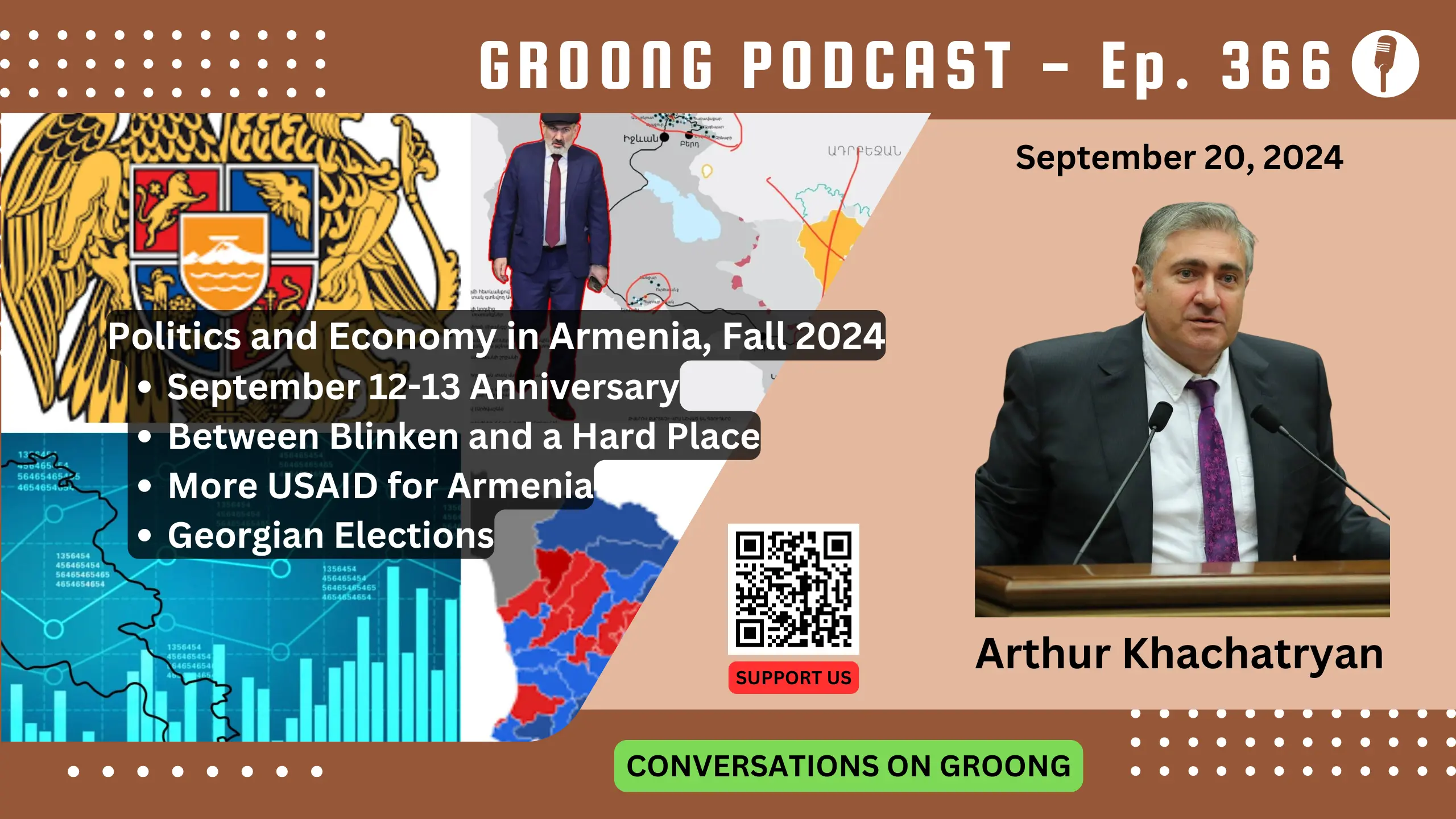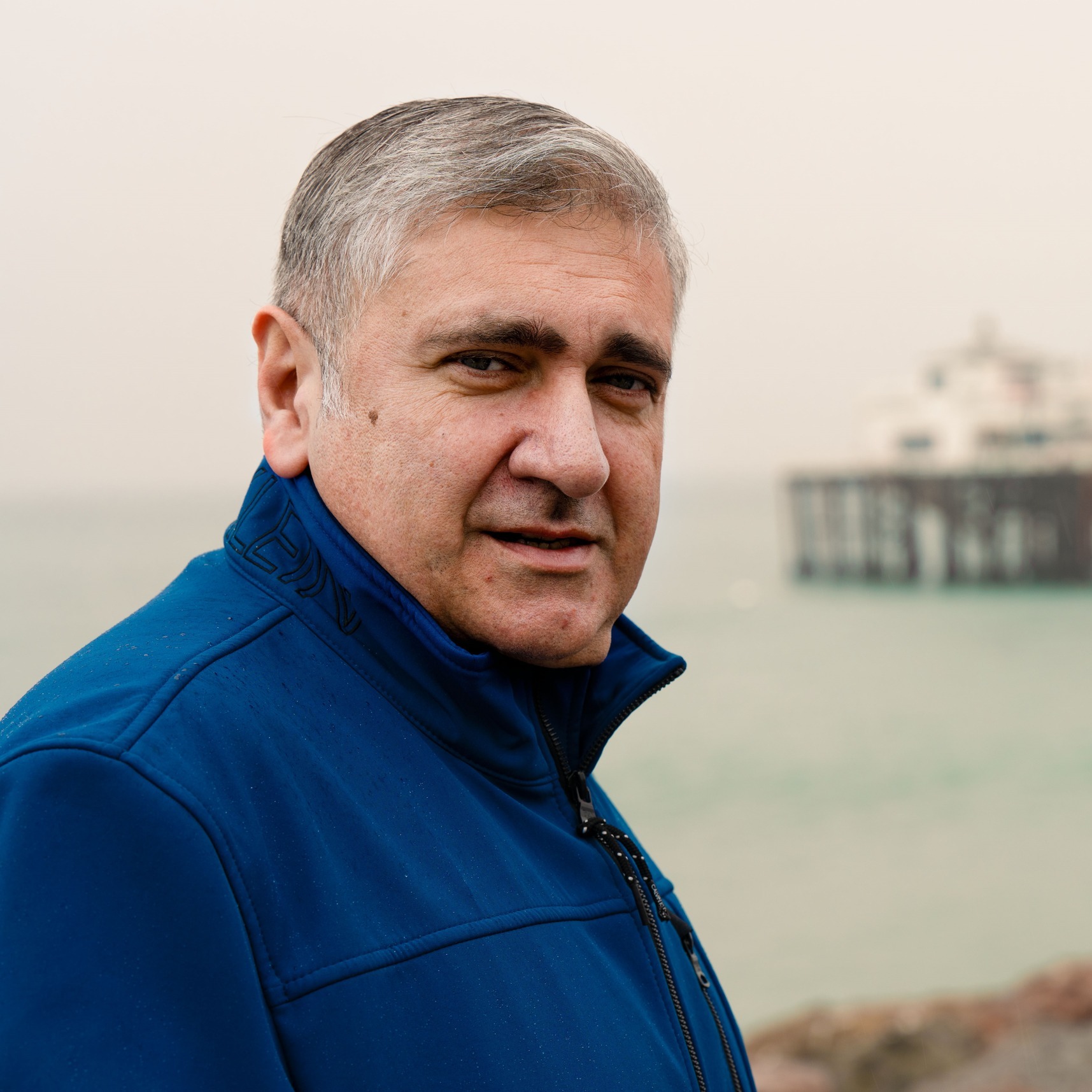Arthur Khachatryan - Politics and Economy in Armenia, Fall 2024 | Ep 366 - Sep 21, 2024 [EP366]
Posted on Saturday, Sep 21, 2024 | Category: Armenia, Artsakh, Nagorno Karabakh, Economy | Series: cog
Groong Links:
Guest:
Topics:
- The Government’s Track Record
- The State of the Economy
- “Pivot to the West”
- Elections in Georgia
Episode 366 | Recorded: September 18, 2024
Show Notes
Politics and Economy in Armenia, Fall 2024
Armenian Government’s Track Record
Let’s start by taking a broad look at Pashinyan and the Civil Contract’s time in power.
- The loss in the 44-day war;
- an economy that seems to be growing but is mostly due to re-exports;
- how they’ve handled traditional alliances, their views on the church and education;
- the strained relationship between Armenia and the Diaspora;
- and of course the so-called “peace negotiations” with Azerbaijan.
There seem to be a lot of unanswered questions.
Questions:
- How does the ARF view this government’s record in negotiations with Azerbaijan?
- Where there is a constant lack of transparency and dishonesty with the people of Armenia, and a lack of any red lines when it comes to national security and territorial integrity.
- How will the opposition turn the table on the government’s failure to perform?
- What recommendations do you have to improve these areas over what this government is doing?
Armenian Economy
Despite the government’s reported growth of 10.4% and a rate of inflation of 2.8% in the first half of 2024, most people say that they’re not feeling this “good economy” in their lives or in their pockets.
Questions:
- What do you attribute the disconnect between the reported good economy and the common citizen’s experience?
- The economy is showing signs of cooling down. Even the minister of finance predicted that for the full year 2024 the government expects a 6% growth. Why is the economy slowing down?
- The refinance rate is at 7.5%, while the Dram has appreciated significantly during 2024. How is this affecting individuals, businesses, as well as the real estate market?
- Much has been said about the government’s numbers being based on an artificially inflated GDP figure, due to the inclusion of the “re-export” aspect of the economy. Does the government plan to recognize this issue?
- Note: affects GDP-to-debt ratio, revenues, taxation, spending, risk assessment (of the economy), ratings, etc…
- Overall remittances into Armenia have decreased by 48%. What do you attribute this to?
- Notes: MIR payment system blockage; Russia making migrant workers process tougher.
- How is the labor market in Armenia? Are there shortages in some industries?
- Why has the IT industry slowed down 13% in 2024?
- Should the IT sector be subsidized anyway?
The government has come under criticism for poor planning of its capital and operational expenditures and also revenues. There are large discrepancies, and the finance minister has tried to explain them away.
Questions:
- What’s the reason why the government is not hitting its marks in projected revenues and expenditures?
- The minister pointed to a “reserve fund”, which this year contained 55 billion Drams. Is this a government emergency fund, what do they use it for?
Armenia’s Pivot To the West
In an environment where the people of the country are not feeling the “economic growth” that the government claims and the prosperity that goes with that, the US in response to Pashinyan’s pivot to the west is telling the people of Armenia “let them eat democracy”. Well, literally the former US ambassador to the OSCE, Dan Baer said that “Armenians must be prepared to endure some cold winters.”
Questions:
- How is Armenia’s pivot to the West going?
“More” USAID for Armenia
When Georgia made its pivot to the west in the 2000s, the US, EU and their partners made heavy investments to boost Georgia. The investments to Georgia could be counted in the billions of US dollars. Yet, despite the Pashinyan regime’s audacious moves to alienate Russia, something that the west has lauded, the actual monetary support seems to be just pocket change.
A week ago USAID announced a doubling of aid to Armenia with another $130 million allocation. The objectives are: improving governance, civil participation in democracy, and improving the sustainable management of natural resources. It also includes support for ‘increasing the competitiveness of certain sectors to reduce reliance on Russia.
Questions:
- Between the politics and the economics of this US Aid, will it make a difference in the lives of the common people?
- Where does it end up going?
- Are these amounts, $130M, $250M, appropriate amounts to effect the desired shifts in Armenia?
Peace Process & Corridors
Armenia’s so-called “Pivot to the West” is also a major factor in negotiations with Azerbaijan & Turkey. So far, Armenia has replaced Russian border guards that were helping Armenia guard its borders with Azerbaijan post-2020 with EU observers armed with binoculars. Armenia is relying less and less on Russian military technology.
Even point 9 of the November 10 statement which clearly states that Russian border guards shall “control” the transportation link between Azerbaijan and Nakhijevan that is supposed to go through Armenia is being interpreted differently it seems. Pashinyan is actively talking about the use of private companies to provide security on these transport links and is publicly saying that despite what is written in the Nov 10 statement, who says that Russians have to be physically on the ground in order to “control” communication.
Pashinyan supporters say that Russia betrayed Armenia and therefore all these moves are justified. Two “intellectual” Armenian backers of Pashinyan (Anna Ohanian and Nerses Kopalyan) recently
Questions:
- What would you say to these arguments? Is there a rational mechanism for Armenia to completely shun Russia, while staying afloat?
- Are Armenia’s much announced military procurements from France and India sufficient to replace Armenia’s reliance on Russian-produced arms?
- If Armenia’s relations with Russia further sour, what could happen to Armenia’s energy security, including supply of gas from Russia or even nuclear fuel? Could Dan Baer’s prophecy happen sooner than we think?
Elections in Georgia
On October 26 Georgia will hold parliamentary elections. The ruling party Georgian Dream’s efforts to rid the country’s domestic politics from foreign influence over the past year have led to an acute crisis between Georgia and the EU. The West is painting these elections as a pivot to the west or to the east.
Question:
- What’s at stake in Georgia and maybe more to the point for us, what’s at stake for Armenia, in these 2024 Georgian parliamentary elections?
In the past week some momentous statements have been made in the Georgian political scene. The Georgian Dream leadership has been floating the idea of apologizing to the people of Abkhazia and South Ossetia. They put the blame on Mikheil Saakashvili’s government in 2008. Of course Saakashvili’s UNM party is also the main opposition party in the upcoming elections.
Russia has apparently suspended social aid to Abkhazia, this is also interesting.
Questions:
- Is it possible that Georgia and Russia may reconcile their differences around Abkhazia and S. Ossetia?
- Given that the railway through Abkhazia has been blocked for decades, does this reconciliation provide Armenia with opportunities? Risks?
Wrap-up
That’s our show! We hope you found it useful. Please find us on Social Media and follow us everywhere you get your Armenian news.
Thanks to Laura Osborn for the music on our podcasts.
Guests

Arthur Khachatryan
Mr. Arthur Khachatryan is an MP from the Hayastan Dashinq (Armenia alliance) and a member of the Armenian Revolutionary Federation (ARF Dashnaktsutyun). In the past, he has held government posts such as Deputy Minister of Territorial Administration and Development, Governor of Shirak, and Minister of Agriculture.
Hosts

Asbed Bedrossian
Asbed Bedrossian is an IT professional, and for years oversaw the central IT enterprise infrastructure and services at USC. His decades of experience spanned across IT strategy, enterprise architecture, infrastructure, cybersecurity, enterprise applications, data center operations, high performance computing, ITSM, ITPM, and more.
Asbed founded the Armenian News Network Groong circa 1989/1990, and co-founded the ANN/Groong podcast in 2020.

Hovik Manucharyan
Hovik Manucharyan is an information security engineer who moved from Seattle to Armenia in 2022. He co-founded the ANN/Groong podcast in 2020 and has been a contributor to Groong News since the late 1990s.
Disclaimer: The views expressed by Hovik Manucharyan on the ANN/Groong podcast are his own and do not necessarily reflect the opinions of his employer or any other organization.